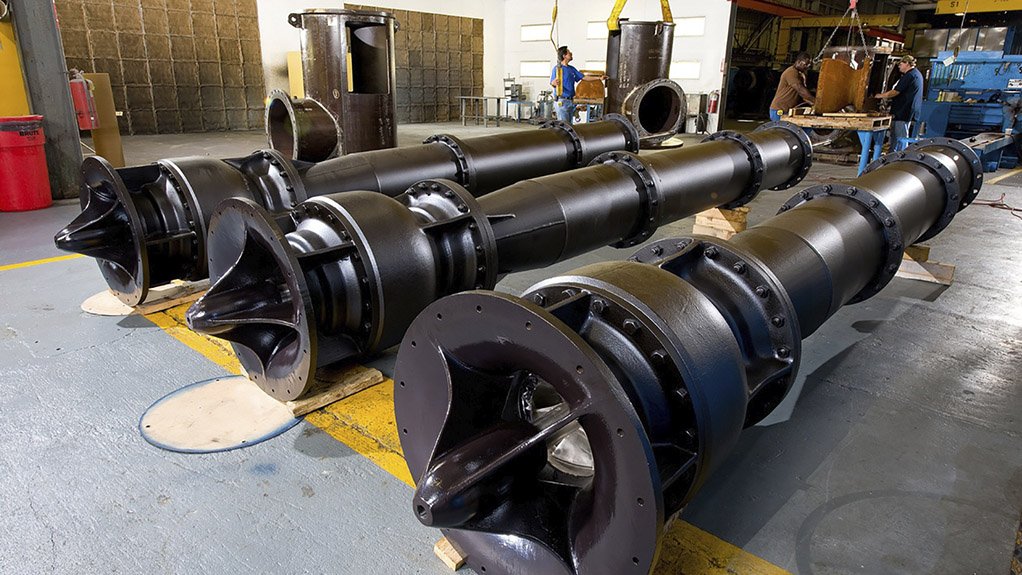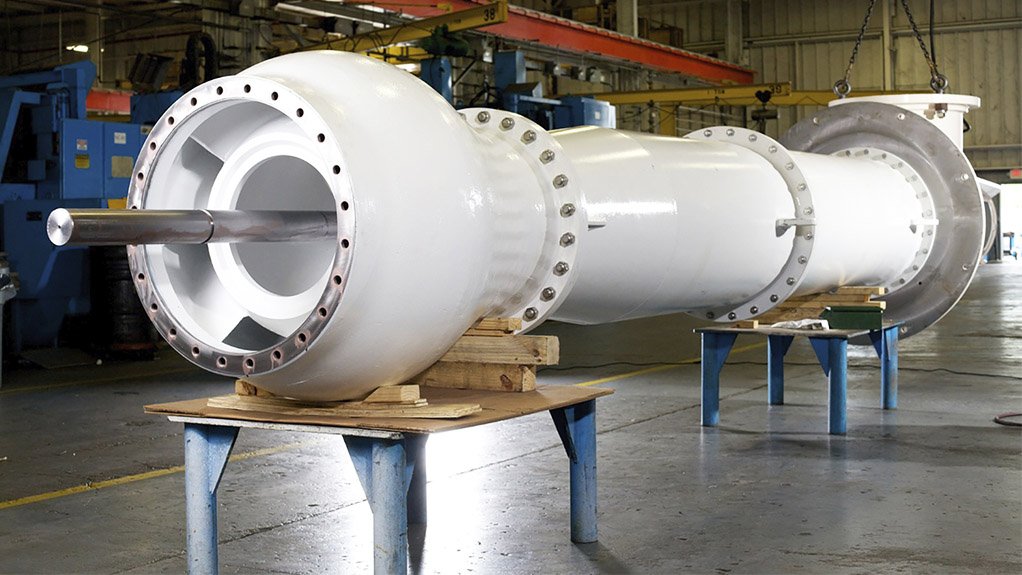Pumps an essential asset



VERTICAL SUSPENDED PUMP The routine maintenance on these pumps can be overlooked
PUMPS EFFICIENCY Following maintenance work, correct reinstallation of the pump is vital for continued reliability
Used throughout the water, petrochemicals and power generation sectors to move large volumes of water, vertical suspended pumps are essential assets, says fluid engineering specialist Sulzer regional sales manager Jason Simcoe and technical adviser Seth Tate.
They add that, by optimising performance and efficiency in these important pumps, both operating and maintenance costs can be significantly reduced. For instance, water is a vital resource that is used in industry for cooling processes and other non-American Petroleum Institute applications.
At the same time, the need to move water between two points, for drainage or flood control, often sees vertical pumps being used because of the reliability of their design.
The vertical suspended pump can be overlooked when it comes to routine maintenance, Simcoe and Tate note, adding that the reliability of their design means that they rarely suffer from situations that attract attention.
However, over time there is an expected gradual decline in efficiency as various components wear, which can be exacerbated if proper maintenance is not carried out.
Maintaining hydraulic alignment to the application is very important to the reliability and performance of the pump, they say. Operating within a tolerance band either side of the best efficiency point (BEP) for the pump increases the resistance to failure. Moving away from this region can lead to increased vibration, reduced bearing life, reduced mechanical seal life, increased random failures and a reduction in overall pump life.
For example, the operator of a power station was running three vertical cooling water pumps, originally designed as duty, standby and backup. Owing to a lack of routine maintenance, the performance of the pumps changed to a point where all three were required to keep up with cooling demand.
The company was contracted to retrofit one of the pumps and after it was reinstalled, it was able to handle normal cooling demand on its own, leaving the other two on standby.
Changing Requirements
Simcoe and Tate highlight that a common situation that is encountered is one where a pump has been in service for many years but during that time the application profile has changed. For example, if the flow rate has been reduced, often by using a control valve downstream of the pump.
This, they underscore, means that the pump could be operating at less than 50% of its design flow rate, which increases operating costs and affects the service life of the control valve. To compound the situation, any loss in pump performance will go unnoticed and the operator will likely open the control valve slightly to compensate.
Therefore, the solution is to adjust the hydraulic profile of the pump so that it is better matched to the revised application. This allows the control valve to be used for its intended purpose, rather than as a restrictor, and the pump is able to work close to its BEP. However, making a single change, such as trimming an impeller, may achieve one desired outcome but at the same time it could present other challenges, so it needs to be carefully analysed.
When considering such changes in design, it is important to consult with a pump original-equipment manufacturer (OEM), such as Sulzer, or a similar expert that can apply computational fluid dynamics analysis if necessary. This will highlight any other changes that may be necessary to ensure efficient and reliable operation.
For instance, reducing flow through a bypass valve may also reduce the efficiency of the pump, which is not a desired outcome as the design alteration needs to consider all aspects of pump operation for the project to be considered a success.
Bearings
Vertical suspended pumps by design rely on good bearing design for continued performance. As such, the options in terms of materials and lubrication systems should be fully understood to ensure the most appropriate system is installed.
By matching the bearing design to the application, they explain that the service life of a pump can be extended and maintenance costs kept to a minimum.
In many cases, the wear in the bearing system determines the maintenance programme for the pump, so the choices that are made at this point can have significant consequences for the future. Taking advantage of composite materials can help to protect against dry running, as well as offering improved anti galling properties and corrosion resistance.
Each application has an optimal bearing design including the lubrication technology that is employed. Some situations are better suited to bearing tube enclosures, while others perform better using product lubricated bearings.
Simcoe and Tate warn that it is important to understand the benefits of each system and to work with a pump design expert that can provide advice on the most appropriate system.
Sealing Systems
When dealing with bearings, it is essential that the sealing system is also considered. While packing has been the predominant design in the past, it still very much has its place in modern sealing systems. Correctly maintained, it complements the bearings providing additional support and helping to dampen vibration.
At the same time, mechanical seals also have their place, depending on the application, and innovations, such as Sulzer’s Liqui-Sea, can offer significant benefits, especially for water cooling pumps, they say.
Further, having completed a maintenance project, correct reinstallation of the pump is vital for continued reliability. Proper alignment of a vertical pump is one of the most important aspects of any maintenance procedure. This applies to the soleplate as well as the intermediate bearings.
Meanwhile, assembly and installation procedures must be completed with the utmost diligence, otherwise the slightest deviation will be compounded along the length of the pump and could result in a significantly shortened service life.
Operators of these pumps should take advantage of the knowledge and expertise available from OEMs such as Sulzer, which has a worldwide network of engineering centres and field service personnel. By working together, these pumps can be updated with modern materials where necessary and optimized for their current applications, Simcoe and Tate conclude.
Article Enquiry
Email Article
Save Article
Feedback
To advertise email advertising@creamermedia.co.za or click here
Announcements
What's On
Subscribe to improve your user experience...
Option 1 (equivalent of R125 a month):
Receive a weekly copy of Creamer Media's Engineering News & Mining Weekly magazine
(print copy for those in South Africa and e-magazine for those outside of South Africa)
Receive daily email newsletters
Access to full search results
Access archive of magazine back copies
Access to Projects in Progress
Access to ONE Research Report of your choice in PDF format
Option 2 (equivalent of R375 a month):
All benefits from Option 1
PLUS
Access to Creamer Media's Research Channel Africa for ALL Research Reports, in PDF format, on various industrial and mining sectors
including Electricity; Water; Energy Transition; Hydrogen; Roads, Rail and Ports; Coal; Gold; Platinum; Battery Metals; etc.
Already a subscriber?
Forgotten your password?
Receive weekly copy of Creamer Media's Engineering News & Mining Weekly magazine (print copy for those in South Africa and e-magazine for those outside of South Africa)
➕
Recieve daily email newsletters
➕
Access to full search results
➕
Access archive of magazine back copies
➕
Access to Projects in Progress
➕
Access to ONE Research Report of your choice in PDF format
RESEARCH CHANNEL AFRICA
R4500 (equivalent of R375 a month)
SUBSCRIBEAll benefits from Option 1
➕
Access to Creamer Media's Research Channel Africa for ALL Research Reports on various industrial and mining sectors, in PDF format, including on:
Electricity
➕
Water
➕
Energy Transition
➕
Hydrogen
➕
Roads, Rail and Ports
➕
Coal
➕
Gold
➕
Platinum
➕
Battery Metals
➕
etc.
Receive all benefits from Option 1 or Option 2 delivered to numerous people at your company
➕
Multiple User names and Passwords for simultaneous log-ins
➕
Intranet integration access to all in your organisation


















